
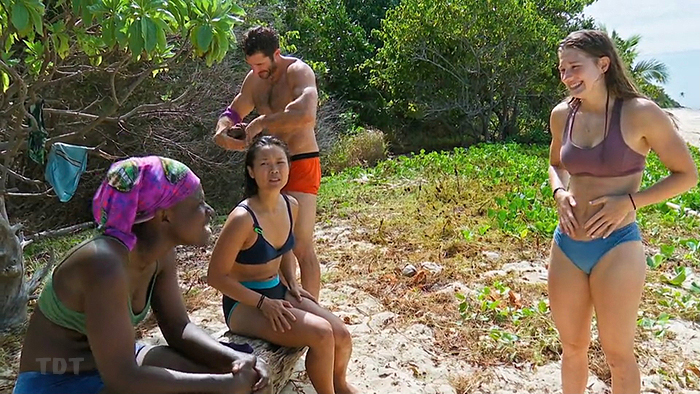
Episodes 3-5 of Survivor 48 had outcomes almost entirely dependent on a single journey. There were strong storytelling moments throughout the latter two episodes, and a big emotional moment that is what Survivor does best, but also an increasing dependence of the game itself on pure luck. The show has cast compelling players once again, and they're providing great dramatic content. So why does the show treat them so disposably?
This episode was, as Star said, "A big day for Eva." The emotional heart of the episode built from Eva's rising frustration during the immunity challenge, as she kept failing on a table maze, triumphantly conquered that task, but then continued spiraling into what she calls "an episode" - an event that was forecast in the premiere, which she had previously asked Joe to help her mitigate. As expected, we saw Joe leap into action, resetting Eva's emotions, providing a safe space, but this apparently required approval from Jeff Probst, because the swap had shuffled Eva and Joe to different tribes, and apparently contestants aren't allowed to interact with players on other tribes after a challenge. Thankfully, Probst explicitly relaxed that rule in this instance, Joe's assistance helped Eva re-center, calm and ground herself, and soon everything was fine. Importantly, Eva got to talk about her autism to a national audience, and demonstrate that it's okay to ask for help, and to receive it.
This was great not just for raising awareness of people with autism, but also great for the show, because it's what it does best. Ever since the New Era began, conservatives have suddenly railed against Survivor and its diverse casting as "woke." But the joke's on them: Survivor has always been woke.
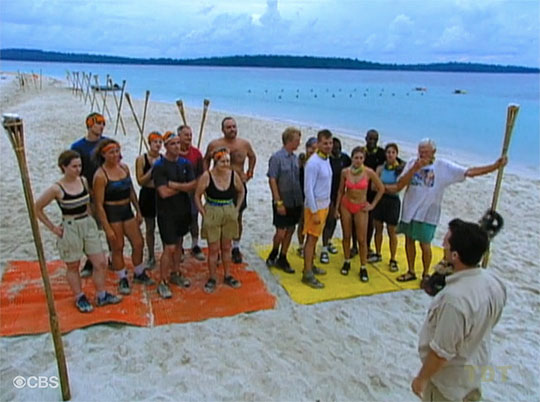
One of Survivor's core strengths has always been taking people "from all walks of life" - including communities infrequently visible on TV - mixing them together, and asking them to set aside their differences and work together for a common goal. (Before stabbing each other in the back, at least.) It's the "social experiment" Jeff Probst has always talked about, or as it was phrased last season, building a "community." Survivor's team-then-individual competition format is a simple but effective way of demonstrating that regardless of whatever propaganda may be excreting from politicians and right-wing media outlets about the boogeyman du jour, deep down, we're all pretty much the same, despite everyone having a different backstory. You'll find something to connect with in all kinds of people, starting with gays and lesbians like Richard Hatch or Sonja Christopher, to deaf people like Christy Smith or Ricard Foyé, to religious minorities such as Muslims like Ibrehem Rahman or Omar Zaheer, to trans or nonbinary people like Zeke Smith or Teeny Chirichillo, to any number of players who are first- or second-generation immigrants to the US.
American politicians have always tried to seize power by dividing the voting population based on lazy, superficial, often imaginary, differences. We've trudged through more than a century of "Hey, poor people! Those scary immigrants over there are coming to take your jobs!" with no let-up. Every ten years or so a scaremongering, completely bogus moral panic erupts, like "Those scary [jazz musicians/ teens dancing to rock-n-roll/ heavy metal listeners/ hip-hop fans/ videogamers/ LGBTQ+ people] are corrupting your children!" This is easy to do when the average person has never actually met anyone from the specific demographic being demonized (Haitian immigrants, trans people). But if you watch Survivor, you'll meet some of those underrepresented folks occasionally. Some may end up seeming heroic, some scoundrels, but at some point, especially early on, they'll be part of a team, and that team will try to win silly competitions together, and then they'll celebrate. Probably with people who might otherwise have wanted to avoid them. It's a tale as old as Richard Hatch and Rudy Boesch. Survivor shows you the world is full of many different kinds of people, but in the end, they're all just people. And even the ones you haven't met before are not as scary as the powers that be want you to think they are.
So it's great - especially in this current moment - to see that Survivor still remembers this core competency, and can still leverage that to deliver emotional moments so powerful that even Jeff Probst, in his 48th season as host, gets choked up. Keep doing this please, Survivor.
Weaponizing journeys: Good stories and bad luck
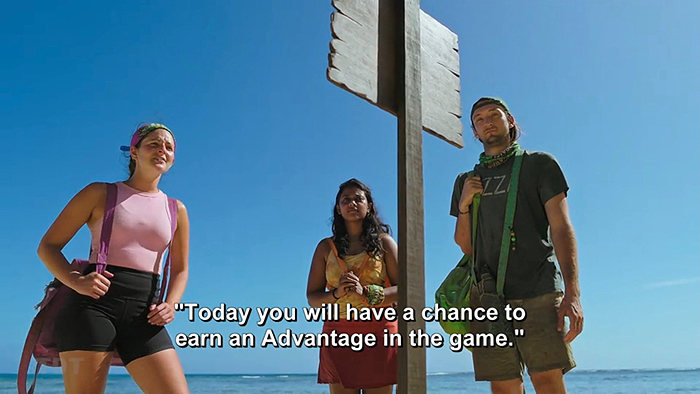
The past two-plus episodes have delivered a fascinating set of compare-and-contrast outcomes to a single journey. Back in Episode 3, there was a post-immunity challenge journey, which has ended up being critical to the fates of all three people who attended. Bianca (who had sat out of the IC), Justin, and Kamilla were all picked to go, by the winning tribe (Lagi). Once the trio arrived at the journey, they learned (1) they had no choice but to participate, and (2) their task was just rolling dice, with equal chances of either losing their vote, or winning an unspecified advantage.
Bianca and Justin lost their votes. Kamilla won an extra vote. That's one big difference, but what's intriguing is: Their eventual fates at Tribal Council also seem to mirror how well they went along with the consensus behavior of their respective tribes.
Justin had to attend Tribal that same day, so he didn't have much time to decide how or even whether to disclose losing his vote. He came up with a cockamamie story that the dice roll (with either a white or a red "question mahk") was for, somehow, the triple option of "shelter, comfort, or food." And that they wouldn't learn what they'd won until the next day. On the one hand, this more or less worked. THe plan was still to vote out Mary, and had Mary's Shot in the Dark not worked, there never would have been an issue (not until the next morning, anyway). Mary would have been out on a 2-0 vote. On the other hand, it also very much did not work.
At the time, this just seemed like bad luck for Justin: Losing his vote in the first place was obviously bad luck, but his alibi more or less worked. He was still working with his allies, and everything would have gone to plan, if not for the Shot in the Dark's 1-in-6 odds.
But as with everything in Survivor, there were more layers and downstream effects. Sai had already established a culture of openness in their alliance. She had shared her Beware idol clue with the Vula tribe's three men, and they'd worked it out together. When Mary's Shot hit, and they had to revote, Justin was caught in his lie: He couldn't vote, because he'd lost it on his journey. While Cedrek briefly stuck with Justin, he eventually relented, as Sai pointed out how she'd been truthful and open with Cedrek. Justin went against his tribe's (and more importantly his alliance's) group trust, and paid the price for it. ("You have to adapt, or you'll be voted out of the tribe.")
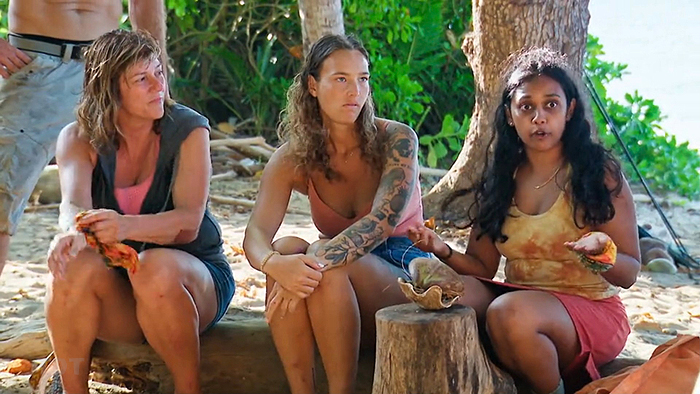
Kamilla's experience was the exact opposite. The Civa tribe had also established a culture of sharing things - mostly from Mitch's post-Ep2-journey revelation that he'd won an advantage, but also from Kyle sharing his Beware idol clue with his alliance, and Kamilla opening it for him. Kamilla considered lying about winning the extra vote on her journey: "I told myself coming into this game, don't share your advantages with anybody. But unfortunately my tribe is too damn honest with each other, and I don't get to hide anything from them." Kamilla correctly read the vibe of the tribe, and followed it. That paid off splendidly in the next episode when she and Kyle were swapped into a minority position on new Vula: She and Kyle trusted each other enough that they could follow each other's leads when lying to the ex-Lagi men, kept up an act for two full days, and pulled off an amazing blindside.
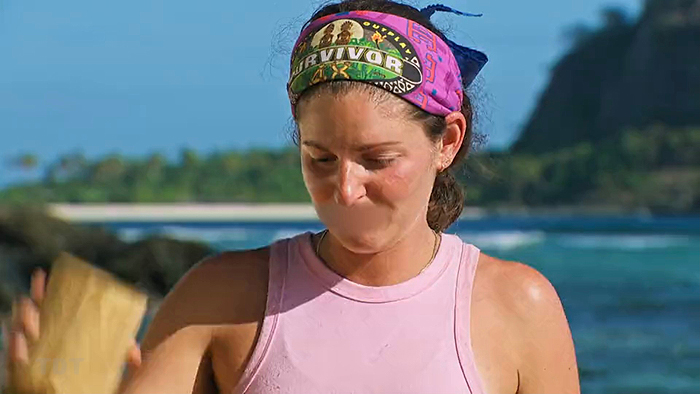
That brings us to Bianca. She also tried to keep her vote loss secret (mostly) upon returning to camp. She told the tribe as a whole (all of whom except maybe Eva she was in an alliance with anyway) that she declined to play the journey game, in order to preserve her vote. (This was not an actual option for her.) She then confided directly to her closest ally, Thomas, that she had in fact lost her vote. At the swap, she became the odd person out - or maybe swing vote - in the new Civa tribe, alongside two original Civas and two ex-Vulas. Importantly both had come from cultures of trust - Cedrek had just kept Sai in the game the night before, based on their openness/honesty, and Chrissy and Mitch were both Civa, the "too damn honest" tribe. Bianca lied to them all, covering up her lost vote, as various sub-alliances within the new tribe tried to lure her "vote" to go with them. Based on the preview for next episode, that's what cooked it for her. As soon as she admitted to Cedrek that she'd lost her vote, alarm bells went off, he told Chrissy, and Bianca was voted out. Bianca thought she was building trust with Cedrek by admitting this to him *before* Tribal, but she was mistaken. She had misread the collective view on honesty initially, and it was too late.
It's interesting that in all these small groups, honesty has become prized over everything. The conventional wisdom in Survivor has long been to keep advantages and idols as secret as possible. Here in the late New Era, that's been flipped. Actual honesty and openness is rewarded. Getting caught lying is now a mortal sin. (Except when Kamilla and Kyle were pulling off the Ep4 blindside - but even that seemed forgiven after the Ep5 reward.)
What's most perilous about that for the contestants is that with multiple journeys per season AND a swap, there's now ample opportunity to fact-check stories. We already saw Kamilla and Star comparing notes about Thomas's and Mitch's journey while on the sit-out bench. We didn't really see what Bianca told her new tribe, but if she spun the "I opted out" lie there as well ... Mitch had been on a journey himself, and would know that was unlikely. Mitch and Chrissy had both heard Kamilla's story about the same journey and may have noticed the flaws in Bianca's story. And while Cedrek and Sai had been told a lie about that same journey by Justin, they at least knew that Mary and Justin had each lost votes on their journeys, so it should seem a bit odd that opting out was an available choice.
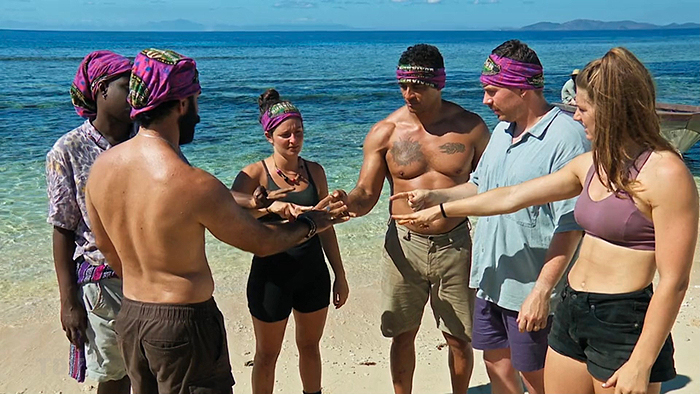
When you combine all these post-journey booby traps lying in wait to ensnare unsuspecting alibi-makers PLUS the fact that the actual journey was a 50-50 dice roll, pure chance, it's increasingly clear the best option is to never go on a journey in the first place. Even there, Survivor took away some of that choice, with the forced use of the throwing fingers system (in Episode 2), with the lowest unique number going - you could throw five, thinking you have no chance whatsoever of going on the journey, and if 2-3 people went with one and 2 people threw a two ... you're fucked. And the people picked from the non-winning tribes in Episode 3 (Justin and Kamilla) also had no choice.
So if there's one thing Survivor should be changing, it's bringing player choice back to journeys. (Or better yet, finding additional room in the budget to bring back full reward challenges, and ditch the journeys entirely, since they're just Temu-brand RCs.) Bianca's alibi was right: You *should* be able to opt out and preserve your vote. Players *should* be able to just volunteer and/or use whatever system they deem fair to assign someone to attend. In SurvivorNZ: Thailand, one group controlled trips to the Outpost by rigging drawing sticks. Let the players be inventive! The current system valorizes following the rules and telling the truth. That's boring and sad in a game of deception.
Shorter takes
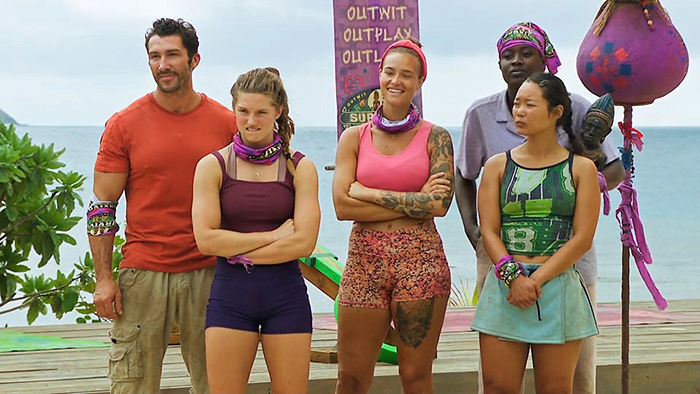
Thought experiment: To a person, just about everyone was moved by the Eva-Joe moment. But what if Eva had been picked to go on the journey in Ep3 (or Ep2), instead of Bianca, and had lost her vote? What if Eva had then picked the orange buff instead of Bianca the next morning? And ended up on the losing Civa tribe, waiting for Sai to finish the table maze as time expired, then found herself heading to Tribal with no vote, caught between two pairs? What if she admitted she had no vote, and was just voted out because of that? There is no moment with Joe, just a compelling contestant cut down by bad luck and a collapsing Jenga tower of production twists. Would anyone feel good about that? So why is risking that somehow good for the show?
 Jeff Pitman is the founder of the True Dork Times, and probably should find better things to write about than Survivor. So far he hasn't, though. He's also responsible for the Survivometer, calendar, boxscores, and contestant pages, so if you want to complain about those, do so in the comments, or on Bluesky: @truedorktimes
Jeff Pitman is the founder of the True Dork Times, and probably should find better things to write about than Survivor. So far he hasn't, though. He's also responsible for the Survivometer, calendar, boxscores, and contestant pages, so if you want to complain about those, do so in the comments, or on Bluesky: @truedorktimes